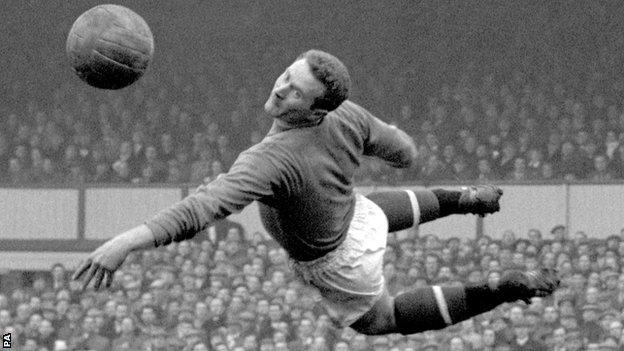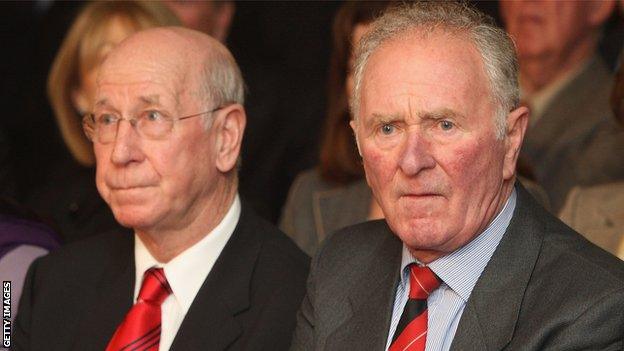Harry Gregg a compelling presence who didn't suffer fools
- Published

Harry Gregg played over 200 games for Manchester United after the Munich air disaster
For a cub reporter, Harry Gregg could be intimidating, cranky even. But if you persevered amid the initial suspicion and barbs, you would find yourself in the company of a storyteller whose turn of phrase would almost have done the great bard justice.
As has been said by a few pundits on the airwaves since the sad news of his passing was made public, Harry Gregg didn't suffer fools gladly.
This reporter was one of the said fools back in February 1998, when I phoned him a few days before the 40th anniversary of the Munich Air Disaster seeking an interview for my then employer, the Irish News.
After making clear his displeasure at being bothered by yet another bloody journalist, he enquired precisely what I knew about the events of Munich.
Thinking I had done my homework, I was happy to inform him that I had read an apparently first-hand account of the disaster which many regarded as THE book on the subject.
However, he quickly and colourfully disabused me of the notion before asking where else my research had taken me. When I ventured another book by a particularly well-known author, his response was even more acerbic.
A silence followed for several seconds before, amid stuttering, I asked him whether I was going to get the interview or not.
"Be here, at the hotel, 10 o'clock on Wednesday." The phone went dead but at least I had been granted an audience.
So it was with a certain amount of trepidation that I made the trek from Belfast to Gregg's Windsor Hotel on Portstewart's promenade.
But I needn't have worried. The 90 minutes or so I spent in Harry Gregg's company remains an experience etched in my memory some 22 years on.
The walls of the hotel were a veritable treasure trove of football memorabilia. A signed photograph of Pele here, international jerseys of the likes of Gordon Banks, John Charles and Denis Law there.
But amid it all, your eyes were inevitably drawn to a large framed photograph of the Manchester United team that played in Belgrade the night before the Munich disaster.
Young men with short haircuts and three from the end, Gregg's eyes focused on the turf as he contemplated the 90 minutes ahead.
As we finally sat down to conduct the business of the morning, ground rules were firmly laid down.
"I don't want any questions about that stuff (another word was used) about me being the hero of Munich."
'That makes it a wee bit tricky', I thought, and proceedings over the next hour and a half were duly directed by the so-called interviewee.
Harry Gregg: The Hero of Munich
Gregg's total recall of the entire week included the trip to the British Embassy in Belgrade on the night of the game, to him winning big on poker against team-mates Johnny 'Digger' Berry, Liam Whelan and Roger Byrne.
The 3-3 draw against Red Star Belgrade had secured United's place in the European Cup semi-final and "some with sore heads, some with not so sore heads" travelled to the airport in the Yugoslav capital the next morning.
Gregg slept all the way through the flight to Munich and when the Elizabethan touched down on the outskirts of the Bavarian capital, "there was not the slightest inkling of anything wrong with the plane".
But after the players boarded the same plane again in Munich, the first two attempted take-offs were aborted before the fateful third go.
"Looking across diagonally, I could see from Roger Byrne's face that he was very, very worried. I became a little stronger because I thought he's more worried than I am," recalled Gregg.
"As we started to really go, somebody laughed like a nervous laugh. Little Digger Berry shouted out: 'I dunno what you're laughing at, we'll all going to get ******* killed'.
"Liam Whelan, as God is my judge said: 'Well if it happens. I'm ready to go'."
Gregg ignored pleas to run from wreckage
After finding himself still alive, Gregg ignored flight captain Jim Thain's plea to run from the burning wreckage.
"All these people were still going, shouting 'run, run, run'. I remember getting a little bit annoyed and shouting: 'Come back. There's people still alive in there'."
After pulling a baby and mother out of the wreckage, Gregg grabbed hold of team-mates Bobby Charlton and Dennis Violet without even checking to see whether they were alive before finding fellow Northern Irishman Jackie Blanchflower in the tail section which was burning fiercely.
"Jackie was crying and moaning saying he'd broken his back and was paralysed. Lying across him face down [and dead] was Roger Byrne and there wasn't a mark on him."
Three days later, Gregg, team-mate Bill Foulkes and assistant-manager Jimmy Murphy travelled over land and by boat back to Britain and within a further 10, the goalkeeper was helping United defeat Sheffield Wednesday in an FA Cup tie.
Eight days after that, United's then special one, Duncan Edwards, became the eighth player to die as a result of the accident after suffering acute kidney failure in Munich's Rechts der Isar Hospital.

Harry Gregg pulled Bobby Charlton from the wreckage of the Munich air disaster
Munich anniversaries continued for Gregg
Back in 1998, Munich's 40th anniversary, Harry Gregg was convinced "this year is going to finish it off".
But 10 years later, he and Sir Bobby Charlton and the other remaining survivors were at Old Trafford for the 50th anniversary when he also travelled to both Belgrade and Munich for the filming of a BBC Sport Northern Ireland documentary.
Two years ago, we had the 60th anniversary as Gregg made his final trip to Old Trafford.
After scarcely speaking publicly about Munich in the first two decades after the crash, Gregg did subsequently recount the tragedy on numerous occasions in media interviews and was always at pains to say that it should not define his life.
Having been voted the best goalkeeper on the planet after starring for Northern Ireland at the World Cup a few months after the tragedy in addition to playing over 200 more games for Manchester United, Gregg was entitled to make the claim.
"I don't live with it all the time. I swear I don't live with it. When this crops up every so often, then I live with it."